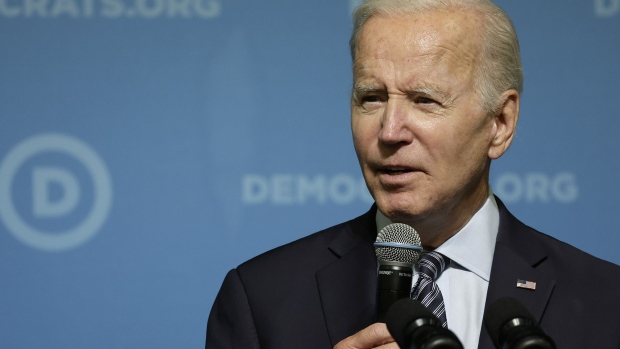President Joe Biden ignored worse-than-expected US inflation data that roiled markets during a planned celebration for his signature climate-and-tax law.
The law Biden celebrated Tuesday is called the Inflation Reduction Act, and the White House has repeatedly said tackling inflation -- a political liability for Democrats before the November midterms -- is the president’s top priority. But after the Labor Department reported, hours before the event on the South Lawn of the White House, that price growth accelerated from July to August, Biden largely focused elsewhere in his remarks: curbing climate change, defeating the drug lobby, his Republican opposition, even guns.
“I believe Republicans could have and should have joined us on this bill,” Biden said during the ceremony that took on a party-like atmosphere with a large crowd and musical performances.
He didn’t mention the latest inflation data at all during his wide-ranging speech.
As Biden was speaking, a broad-based selloff sent equities to their worst day in more than two years as fears mounted that the Federal Reserve will adopt an even more aggressive pace of monetary tightening.
Republicans leveled fresh attacks at Biden’s economic policies and accused the White House of political tone-deafness.
“They could not look more out of touch if they tried,” Senate Minority Leader Mitch McConnell said Tuesday.
“Biden and Democrats throwing themselves a party for raising taxes on families during a recession proves just how out of touch they are,” Republican National Committee Chairwoman Ronna McDaniel said in a statement.
Asked on Tuesday evening if he was worried about inflation, Biden said, “I’m not, because we’re talking about one-tenth of one percent.”
“The stock market doesn’t necessarily reflect the state of the economy, as you well know,” he told reporters after voting in Wilmington, Delaware. “The economy is still strong, unemployment is low, jobs are up, manufacturing is good. So I think we’re gonna be fine.”
Earlier in the day, Biden said in a statement that the latest data showed “progress” toward curbing price gains but acknowledged more work is needed.
“Today’s data show more progress in bringing global inflation down in the US economy,” Biden said, hailing a drop in gas prices and adding, “It will take more time and resolve to bring inflation down.”
Headline consumer prices increased in August by 0.1%, hotter than a forecast decline of the same figure. Core inflation, a measure that strips out volatile fuel and food costs and is closely watched by the Fed, rose by 0.6%, double the forecast. Year-over-year inflation dropped for the second month, to 8.3%, but also exceeded the forecast of 8.1%.
Read more: Biden Plan to Talk Up Economy Slams Into Harsh Inflation Reality
Tuesday’s price growth report is a sign of a persistent headwind facing Biden and Democrats before the Nov. 8 midterms and cuts against other positive economic data that boosted their prospects for retaining control of at least one chamber of Congress.
They’ve scrambled to ease price pressures by trying to tackle supply chain woes, releasing crude from the Strategic Petroleum Reserve and passing a tax-and-spending package aimed at cooling inflation in the long run.
The effect of the law passed by Democrats last month -- without any Republican support -- will take years to fully sink in and have only a modest impact on price gains.
The White House event was scheduled weeks ago as the US saw a steady decline in gasoline prices, which have dropped to an average of $3.71 a gallon nationally from a high of $5.02 in June.
That drop, though, was offset by price hikes elsewhere, including in shelter costs. The August increase brought shelter inflation over the last 12 months to 6.3%, the highest over any such stretch since 1986.
Read more: Biggest Jump in US Rents Since 1991 Keeps Overall Inflation High
While the decline in gasoline prices has tempered what would otherwise have been even hotter price growth, Biden is not out of the woods there, either.
US officials worry that a rebound in oil prices could be coming if European Union sanctions due to kick in later this year aren’t accompanied by other measures, such as a price cap on the purchase of Russian oil.
Source: bnnbloomberg.ca













